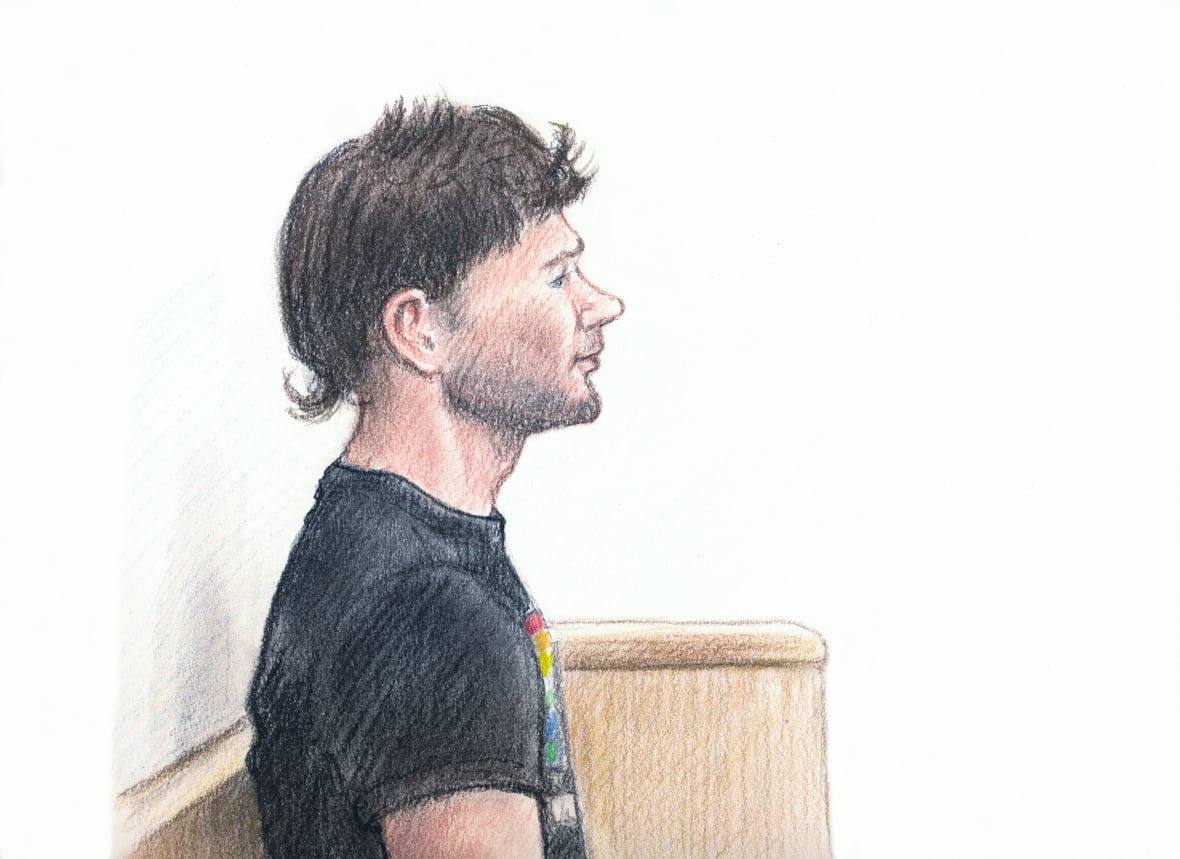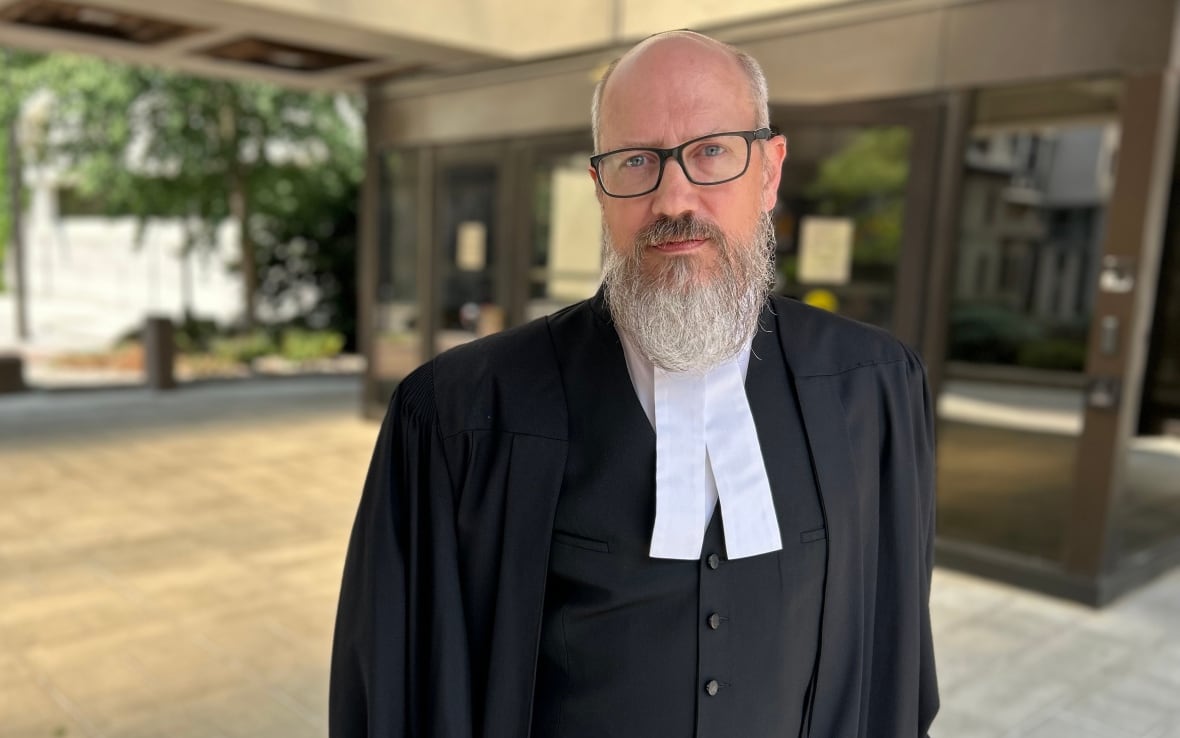Former city lawyer who defaced National Holocaust Monument pleads guilty
Iain Aspenlieder, 46, released on bail ahead of sentencing under strict conditions, including GPS monitoring
A former City of Ottawa lawyer has pleaded guilty to mischief after defacing the National Holocaust Monument last month, and is being released on bail ahead of sentencing proceedings at a later date.
Iain Aspenlieder, 46, stood in the prisoner's box next to his defence lawyer in Superior Court on Friday afternoon wearing a black T-shirt featuring a rainbow and the slogan "we are all in this together" as he pleaded guilty to mischief to a war memorial. Charges of mischief over $5,000 and harassment by threatening conduct are expected to be withdrawn at sentencing.
Court heard that dawn broke on Monday, June 9, to reveal the words "FEED ME" painted in blood-red capital letters on a prominent wall of the holocaust monument along busy Wellington Street — also home to the Parliament Buildings and the Supreme Court.
The hand-painted and splashed graffiti was a nod to war-torn Gaza, which the United Nations had described as the "hungriest place on Earth" just three days earlier. The vandalism was quickly covered with a tarp before being pressure-washed off.
The Crown and defence agreed to release Aspenliender into the care of his parents, under GPS monitoring and other strict conditions, but they do not agree on what his sentence should be. A hearing will be scheduled for sentencing arguments and victim impact statements.
Aspenlieder signed an agreed statement of facts read in court by acting deputy Crown attorney Moiz Karimjee. Aspenlieder acknowledged that the Crown will seek a prison sentence for his crime, arguing that it "threatens the rule of law" by attempting to achieve political ends through unlawful means, "just like the Freedom Convoy."

'I'm wearing incriminating evidence'
Surveillance footage provided by the National Capital Commission showed Aspenlieder arriving at the monument on a bicycle at 2:59 that morning, Karimjee said. Aspenlieder threw paint on the monument, used a paintbrush to scrawl the words and threw away the paint cans before leaving nine minutes later.
Police found out where the brush and paint (in a shade called "tropical heat") had been bought, and staff at the hardware store provided a description of the man and the receipt tying Aspenlieder to the June 8 purchase.
When officers arrived at his Ottawa home to arrest him on June 27, he was wearing a shirt with red paint on it and told them: "I'm wearing incriminating evidence."
Jewish community feared for their safety
The vandalism to the memorial caused some people in the Jewish community "to reasonably fear for their safety and the safety of their loved ones, as they were being targeted for accusations against Israel," Karimjee told court.
In the cellblock at Ottawa police headquarters on Elgin Street, Aspenlieder said he accepted responsibility for the vandalism. He declined to discuss his motivations and denied having mental health issues, Karimjee said.
At his unsuccessful bail hearing in late June, Aspenlieder told court he started a hunger strike on June 8 — the same day he bought the paint — and that he'd asked Prime Minister Mark Carney "to acknowledge that [Israeli Prime Minister] Benjamin Netanyahu is a war criminal and he's complicit in genocide."
He gave up his hunger strike on July 2, according to staff at Ottawa's jail — the same day he was denied bail.

'Actions weren't motivated by hate'
As he awaits sentencing, Aspenlieder is ordered to remain at his parents' property outside Ottawa at all times, with some routine exceptions for medical, legal and other reasons. He's barred from possessing weapons and accessing social media, he can't engage in protests, actions or discussions related to the conflict in the Middle East, and he can't publish anything about his charges.
Justice Anne London-Weinstein told counsel she was concerned about stopping Aspenlieder from talking about what's happening in Gaza, saying that "many people are concerned and speaking out" and "have grave concerns about what's going on there.
"In my view, restricting his freedom of speech to that degree is a pretty drastic bail term, I'll put it that way," she said.
The lawyers agreed that the defence can return to court to seek a bail variation down the road if necessary.
Speaking outside court Friday, defence lawyer Michael Spratt said his client knows that using the monument to broadcast his message of protest was wrong.
"What's important to understand is that his message and his actions weren't motivated by hate, but were motivated by a genuine concern — a concern that was expressed by the prime minister as well with respect to the ongoing situation in Gaza," Spratt said.
"It's because of where that message was painted, that's why he's pled guilty ... that's what he's taken responsibility for."

'It's a sacred place'
Lawrence Greenspon, a prominent defence lawyer and co-chair of the National Holocaust Monument committee, said Friday that the message may not have been hateful, but where it was placed and the manner in which it was done caused the Jewish community concern.
"It is a sacred place. It is a monument that recognizes a terrible — the worst — type of mass murder that has ever taken place in history, and it is certainly more the place than the message which is what is hurtful in this case," Greenspon said.
He added that the month Aspenlieder spent in jail ahead of his release is significant and sufficient to deter people from committing similar crimes.


